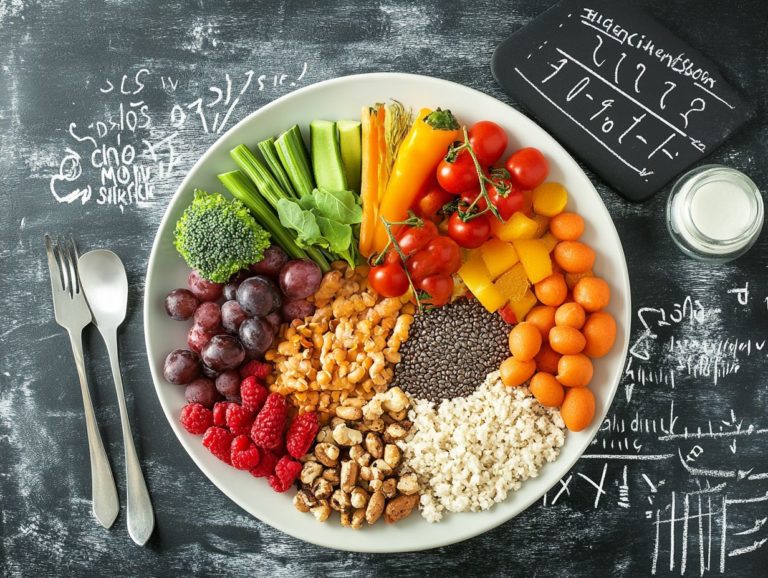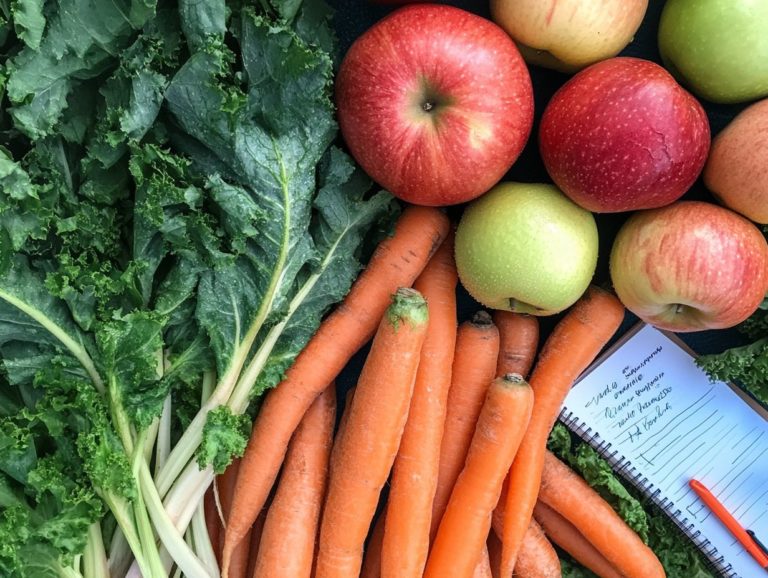How to Balance Carbs and Proteins in Your Diet
Carbohydrates and proteins are foundational elements of a healthy diet, each fulfilling distinct roles within your body. By understanding these nutrients, you can make informed dietary choices that align with your health goals.
This article delves into the nature of carbohydrates and proteins, their significance, and how to strike the right balance between them. Whether you’re focused on weight loss or muscle building, you’ll find customized strategies and recommended ratios to guide you.
Discover tips for maintaining a diverse and balanced diet that keeps you energized and satisfied.
Contents
- Key Takeaways:
- Understanding Carbohydrates and Proteins
- Determining Your Ideal Carb and Protein Intake
- Balancing Carbs and Proteins for Weight Loss
- Balancing Carbs and Proteins for Muscle Building
- Tips for Maintaining a Balanced Diet
- Frequently Asked Questions
- Why is it important to balance carbs and proteins in your diet?
- How can I find the right balance of carbs and proteins for my diet?
- What are some good sources of carbs and proteins?
- Can I lose weight while balancing carbs and proteins?
- Should I limit carbs or proteins in my diet?
- Try These Tips for Balancing Carbs and Proteins!
Key Takeaways:
- Understanding the difference between carbohydrates and proteins is crucial in achieving a balanced diet.
- Knowing your individual needs and considering factors like activity level and health goals can help determine your ideal intake of carbs and proteins.
- A balanced intake of carbs and proteins is essential for both weight loss and muscle building.
- Recommended ratios and strategies can help achieve optimal results.

Understanding Carbohydrates and Proteins
Understanding carbohydrates and proteins is essential for achieving optimal nutrition. These nutrients form the cornerstone of a balanced diet that enhances your energy levels and contributes to overall health.
Carbohydrates, particularly complex and healthy options, offer your body a quick source of energy. Proteins, including lean varieties, are vital for muscle repair and growth.
Together, they play significant roles in managing blood sugar levels and nutrient absorption. This forms the basis for dietary guidelines designed to promote healthy eating and prevent chronic conditions like diabetes and metabolic syndrome.
What Are Carbohydrates?
Carbohydrates are organic compounds composed of sugar molecules that serve as your body’s primary energy source. They can be categorized into simple and complex forms.
Simple carbohydrates, found in fruits and sugary delights, provide a quick burst of energy. Complex carbohydrates, such as whole grains and legumes, release energy more gradually, which is critical for maintaining your stamina during physical activities.
What Are Proteins?
Proteins are made up of amino acids and are essential for muscle repair, growth, and overall well-being. Their diverse amino acid composition dictates their various functions.
By prioritizing both carbohydrates and proteins, you support your active lifestyle and help yourself thrive.
Importance of Balancing Them in Your Diet
Balancing carbohydrates and proteins in your diet is crucial for maintaining energy levels and fulfilling your nutritional needs. For more detailed guidance, check out this resource on how to balance nutrients in a diet. This balance can ultimately support weight loss and enhance your overall health.
When you choose the right types of carbs think whole grains and vibrant vegetables alongside quality protein sources like lean meats or legumes, you re setting yourself up for sustained energy throughout the day. This smart combo helps prevent energy crashes and decreases the temptation for excessive snacking, aiding appetite regulation.
Proteins play an essential role in muscle repair and growth, boosting metabolism and ensuring your body receives the necessary amino acids. By prioritizing this balance, you ll likely find yourself enjoying effective weight control and improved digestion.
Determining Your Ideal Carb and Protein Intake
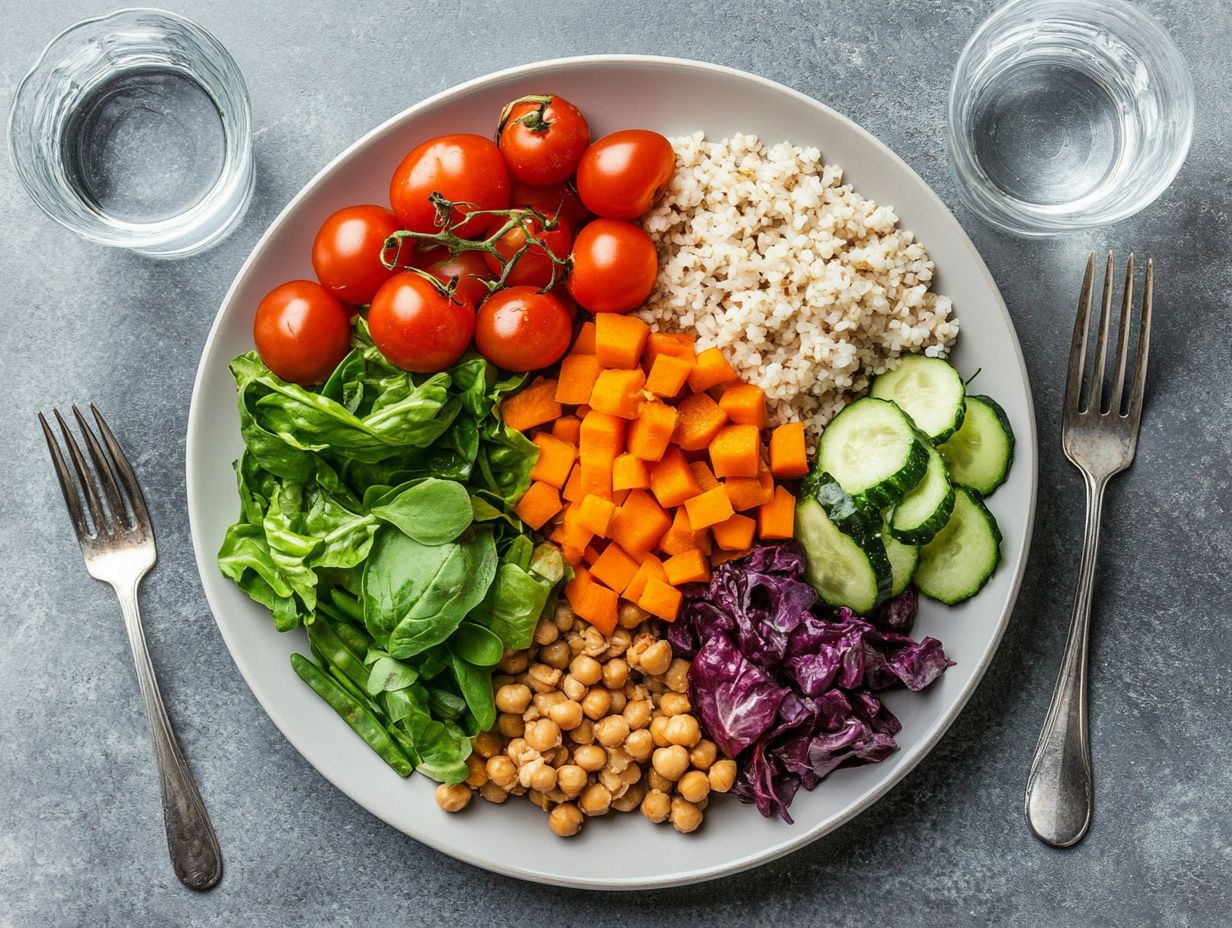
Determining your optimal carbohydrate and protein intake demands a tailored approach. This strategy should take into account your specific dietary needs, activity level, and health objectives.
This personalized approach ensures that you effectively meet your nutritional requirements and enhance your overall well-being. Start balancing your carbs and proteins today to unleash your best self!
Factors to Consider
When you re figuring out your ideal carbohydrate and protein intake, several important factors come into play. These include your age, activity level, any health conditions like diabetes or kidney disease, and your overall dietary goals.
Understanding how these elements interact is essential for making effective dietary choices. For example, if you have diabetes, pay close attention to your carbohydrate sources. Focus on complex carbs rather than simple sugars to keep your blood sugar levels steady.
On the other hand, if you re managing kidney disease, you must be mindful of your protein intake. This helps prevent putting too much strain on your kidneys while ensuring you meet your necessary amino acid needs.
Tailored nutrition is key to creating meal plans that not only address your specific health concerns but also optimize your body composition. This approach aids in weight management and enhances your overall wellness.
Balancing Carbs and Proteins for Weight Loss
To achieve effective weight loss, balance carbs and proteins through thoughtful meal planning and strategic carbohydrate-to-protein ratios. This approach ensures that you feel satiated while managing your calorie intake effectively.
Recommended Ratios and Strategies
Recommended ratios for balancing carbs and proteins typically favor a higher protein intake to aid in weight control. To achieve this, consider how to balance macronutrients in meal plans by employing various strategies, such as incorporating protein-rich foods and healthy fats into your meals.
These dietary adjustments are vital for establishing a sustainable approach to weight loss. By prioritizing foods rich in protein like lean meats, legumes, and dairy you can effectively support muscle maintenance while shedding excess fat.
Healthy fats from sources such as avocados, nuts, and olive oil not only elevate the flavor of your meals but also enhance satiety, making it easier to maintain a calorie deficit.
By thoughtfully combining these elements with a measured carbohydrate intake, you can create a more balanced diet that fosters long-term health benefits and promotes a thriving metabolism.
Balancing Carbs and Proteins for Muscle Building
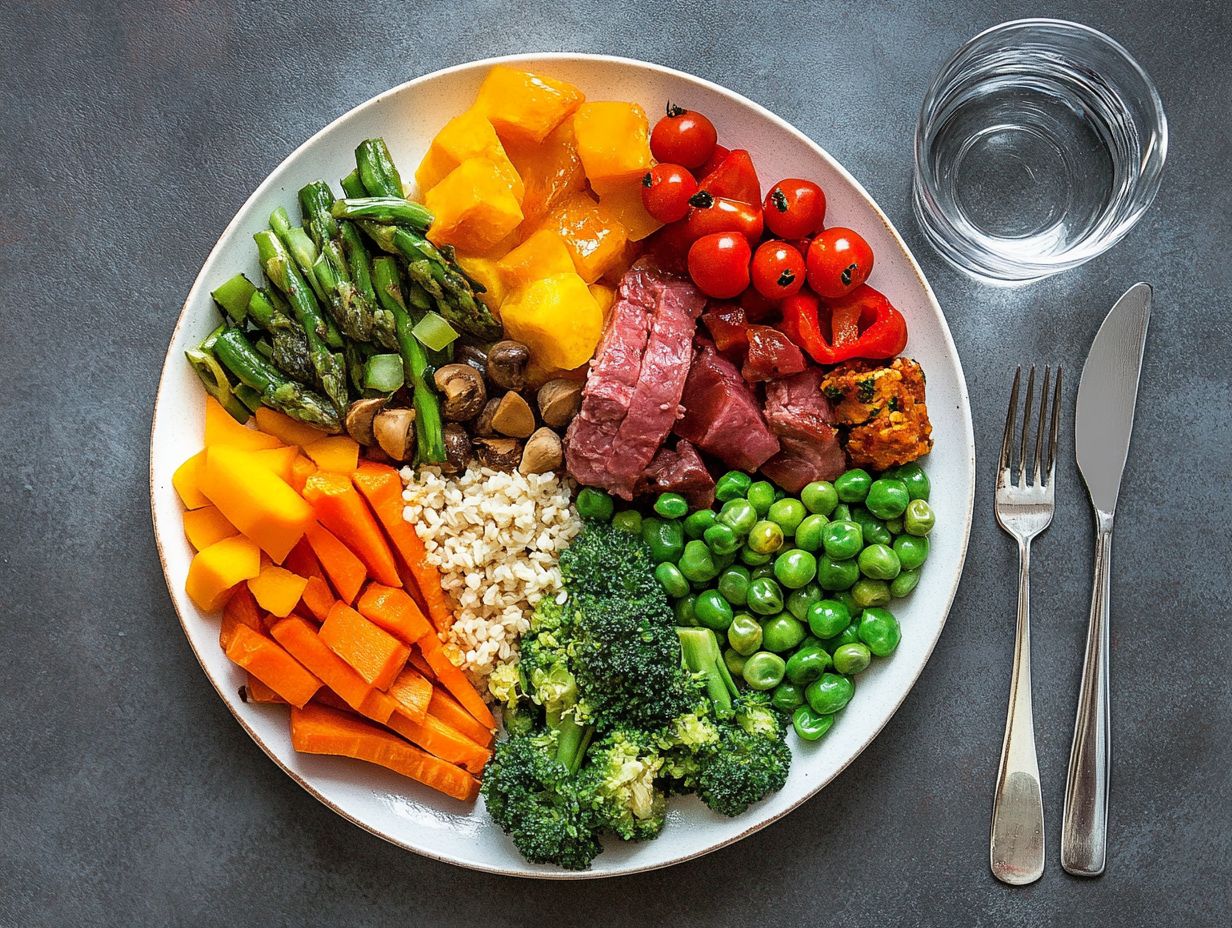
Balancing carbohydrates and proteins is essential for your muscle-building journey. Adequately meeting your protein needs is crucial for repairing and growing muscle. Carbohydrates provide the necessary energy to power your workouts and support recovery.
Prioritizing this balance will help you maximize your results and enhance your overall performance.
Recommended Ratios and Strategies
For optimal muscle building, follow dietary guidelines that recommend a higher protein intake, typically in a ratio of 1:2 or 1:1 with carbohydrates. This ensures you have the energy needed for workouts and recovery. Achieving this balance fuels your intense training sessions and supports muscle repair and growth.
To implement this effectively, focus on incorporating a variety of protein sources, such as lean meats, eggs, and plant-based options like beans and lentils. When planning your meals, integrate complex carbs like whole grains and vegetables to maintain sustained energy.
A well-timed post-workout meal, ideally consumed within 30 minutes, should include both protein and carbs in similar ratios to maximize nutrient absorption. By monitoring your daily intake and adjusting based on your workout intensity, you can maintain an effective muscle-building strategy.
Tips for Maintaining a Balanced Diet
Maintaining a balanced diet calls for mindful eating practices that emphasize the importance of variety and moderation. Prioritize incorporating a diverse array of nutrient-dense foods, such as whole grains, lean proteins, and fiber-rich options, into your meals.
This exciting approach not only fuels your body but can also boost your overall wellness!
Start balancing your nutrients today for a healthier tomorrow!
Incorporating Variety and Moderation
Incorporating variety and moderation into your diet is essential for healthy eating. This approach ensures you receive a broad spectrum of nutrients necessary for optimal nutrition and nutrient absorption.
A well-rounded approach encourages you to embrace different food groups. Enjoy vibrant fruits and vegetables, whole grains, lean proteins, and healthy fats.
By exploring various cuisines and cooking methods, you can uncover new flavors and textures. These not only enhance your meals but also promote nutrient richness.
For instance, consider meatless meals occasionally or experiment with unique grains like quinoa or farro. This can greatly expand your culinary palate.
Practicing mindful portion control allows you to savor these diverse foods without overindulgence. Ultimately, this fosters a balanced diet that supports your overall health.
Frequently Asked Questions
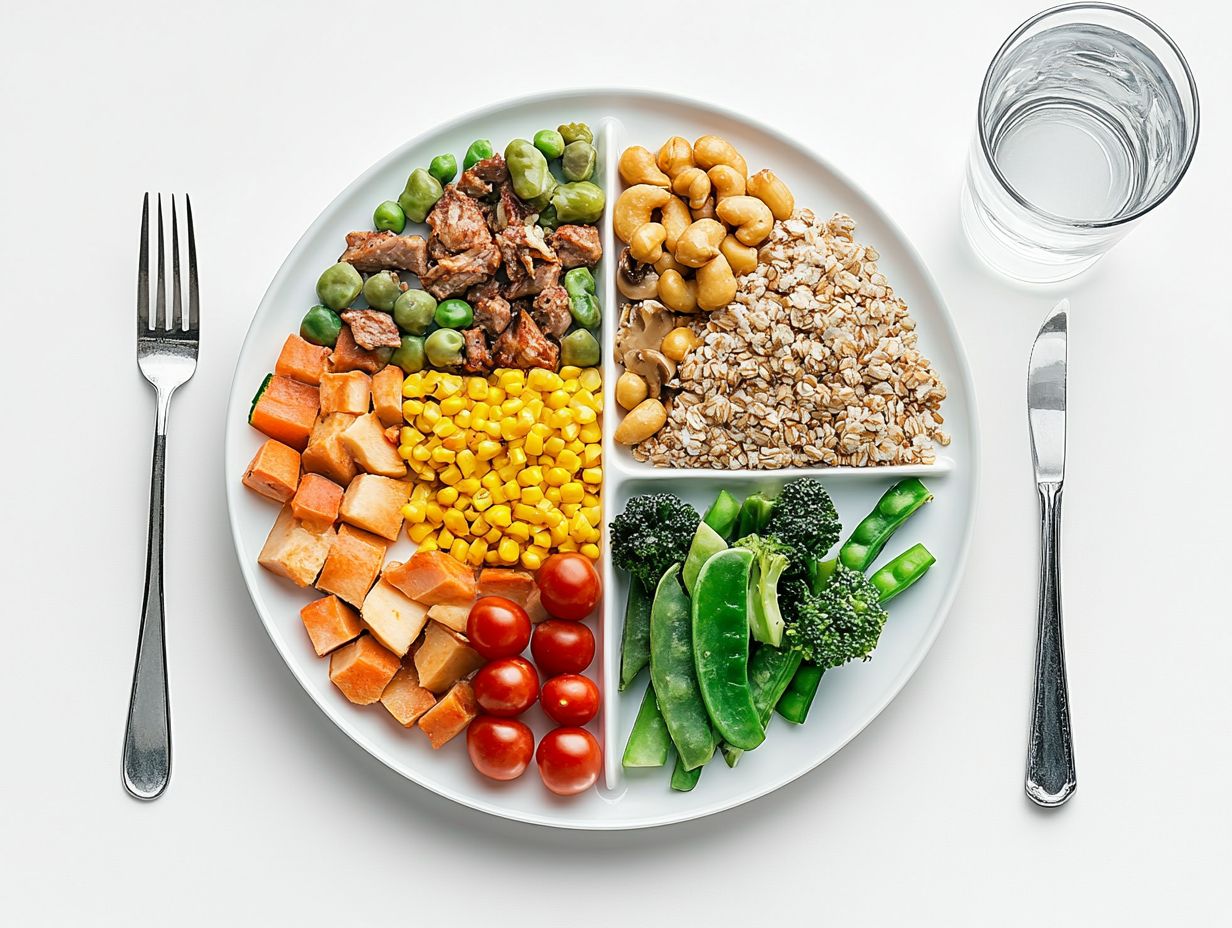
Why is it important to balance carbs and proteins in your diet?
Balancing carbs and proteins is crucial for maintaining good overall health. These nutrients provide energy and contribute to various bodily functions, such as building and repairing tissues.
How can I find the right balance of carbs and proteins for my diet?
The recommended daily intake of carbs and proteins varies based on factors like age, gender, and physical activity level. Generally, aim for a balanced diet consisting of 45-65% carbs and 10-35% proteins.
What are some good sources of carbs and proteins?
Good sources of carbs include whole grains, fruits, and vegetables. For protein, consider lean meats, poultry, fish, beans, and legumes.
Can I lose weight while balancing carbs and proteins?
Yes, you can lose weight while maintaining a balanced intake of carbs and proteins. Including lean proteins can help you feel fuller for longer, reducing the temptation to overeat carbs.
Should I limit carbs or proteins in my diet?
Neither carbs nor proteins should be eliminated from your diet. Both are important for different bodily functions. Focus on choosing healthier sources, like whole grains and lean proteins, and avoid excessive intake of processed and high-fat options.
Try These Tips for Balancing Carbs and Proteins!
An easy way to balance carbs and proteins in your meals is to fill half your plate with non-starchy vegetables, a quarter with lean protein, and a quarter with healthy carbs. Incorporating snacks that contain both, like Greek yogurt with berries, can help maintain balanced intake throughout the day.



